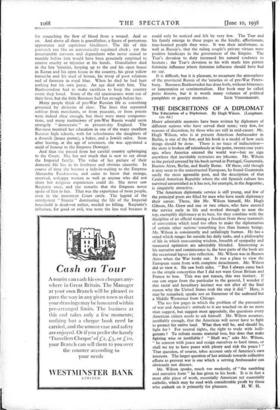THE DISCRETIONS OF A DIPLOMAT
MANY admirable memoirs have been written by diplomats of different nations who have served their term; very few, for reasons of discretion, by those who are still in mid-career. Mr. Hugh Wilson, who is at present American Ambassador in Berlin, is one of the few, and his book is a model of how such things should be done. There is no trace of indiscretion— the story is broken off relentlessly at the point, twenty-one years ago, when America entered the world war—but no sign anywhere that inevitable restraints are irksome. Mr. Wilson in the period covered by his book served in Portugal, Guatemala, Buenos Aires, Berlin, and finally Berne. Of these, odd though it may seem to the uninstructed European, he found Guatemala easily the most agreeable post, and the description of that Central American Republic where the old Spanish culture has survived untarnished as it has not, for example, in the Argentine, is singularly attractive.
The American diplomatic service is still young, and few of the principal posts are filled by men who have made diplomacy their career. Those, like Mr. Wilson himself, Mr. Hugh Gibson, Mr. Grew and one or two others, who have entered the service early in life and worked through to near the top, exemplify diplomacy at its best, for they combine with the discipline of an official training a freedom from those trammels of convention which tend too often to make the diplomatists of certain other nations'something less than human beings. Mr. Wilson is consistently and unfailingly human. He has a mind which ranges far outside his daily tasks, and a philosophy of life in which unassuming wisdom, breadth of sympathy and measured optimism are admirably blended. Interesting as his narrative and reminiscence is, the best parts of the book are the occasional lapses into reflection. Mr. Wilson was in Buenos Aires when the War broke out. It was a place to view the European scene from with complete detachment. Mr. Wilson did so view it. He saw both sides. " But I always came back to the simple conception that I did not want Great Britain and France to lose. This was not reason, this was instinct. IF one can argue from the particular to the general, I wonder if this racial and hereditary instinct was not after all the final reason why the United States took the step it did." Here, it may be remarked, speaks not an Easterner of the seaboard but a Middle Westerner from Chicago.
The too few pages in which the problem of the prevention of war and America's attitude to it are touched on do no more than suggest, but suggest most appositely, the questions every American citizen needs to ask himself. Mr. Wilson assumes, justifiably enough, that the American will never have to fight to protect his native land. What then will he, and should he, fight for ? For neutral rights, the right to trade with belli- gerents ? To refrain means material loss, but does that make fighting wise or justifiable ? " Shall we," asks Mr. Wilson, " be content with peace and resign ourselves to hard times, or shall we try to have peace with plenty and risk the peace ? " That question, of course, takes account only.of America's own interests. The larger question of her attitude towards collective efforts to prevent war is one which a serving Ambassador can obviously not discuss.
Mr. Wilson speaks, much too modestly, of " the rambling and narrative form " he has given to his book. It is in fact a most able piece of work, essentially American yet essentially catholic, which may be read with considerable profit by- those
who embark on it primarily for pleasure. H. W. IL










































 Previous page
Previous page